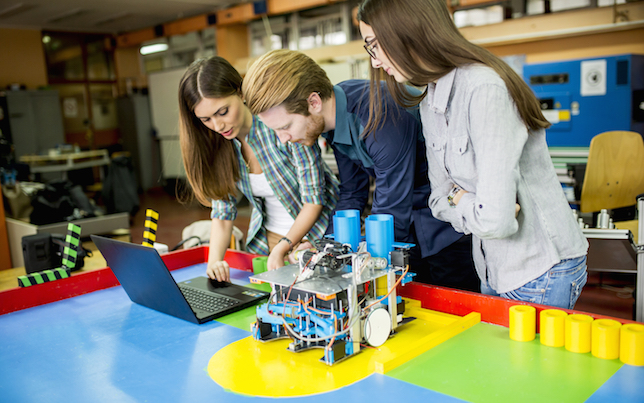Biggest Challenges Facing K–12 STEM Ed: PD, Accountability Systems, CS Curricula

As K–12 STEM (science, technology, engineering, mathematics) education tries to move full steam ahead in schools nationwide, thousands of teachers, principals, policymakers and others are saying some major challenges still persist. To help conceptualize and dismantle these issues, a national nonprofit organization Thursday released a map of more than 100 problems currently facing STEM education. In addition, it revealed a $28.175 million investment from Google, AT&T, Chevron and other organizations to address these challenges.
The resulting “Grand Challenges” interactive map is a two-year project from 100Kin10, a nonprofit with the ambitious goal of training 100,000 teachers in 10 years (by 2021). To identify and map the 100-plus challenges, 100Kin10 conducted extensive background research leveraging the support of its network — including surveys with thousands of teachers, principals, nonprofit leaders, researchers, policymakers, union representatives and other education stakeholders. In addition, complexity and mapping scientists as well as strategists across the business and tech sectors contributed to the analysis, according to a prepared statement from 100Kin10.
Among the challenges are various job performance, culture, policy and financial drivers that “affect many other causes but are affected by relatively few,” the statement said. While 100-plus obstacles might seem like a lot for STEM stakeholders to chew on, 100Kin10 has traced these down to six root causes.
Areas of difficulty include:
- The time for pre-K–12 STEM teachers to participate in professional development during the school day;
- The ability of districts to identify high-quality computer science curriculum;
- The time for pre-K–12 STEM teachers to collaborate during the school day;
- The number of testing and accountability systems that promote pre-K-12 STEM teacher creativity in the classroom;
- The number of states with strong pre-K–12 science standards; and
- Scholarships or loan forgiveness for STEM college majors entering pre-K–12 STEM teaching jobs.
“This roadmap will allow us to mobilize 100Kin10 partners to address the root causes of the STEM teacher shortage head-on, and in doing so, help ensure America remains a beacon of innovation and competitiveness for generations to come,” said Talia Milgrom-Elcott, executive director and co-founder of 100Kin10, in a prepared statement.
One 100Kin10 partner for example, the University System of Maryland (USM), has used Grand Challenges to focus its work with Baltimore City Public Schools (BCPS) on a particularly pressing challenge: implementing Next Generation Science Standards for all its students without enough physics teachers.
Nancy Shapiro, associate vice chancellor for education and outreach and special assistant to the chancellor for P-20 education at USM, in a prepared statement explained: “We count on 100Kin10 summits, forums and solution labs to help us meet this very real challenge through opportunities to share and problem-solve with other partners who are committed to similar challenges.”
To support 100Kin10 partners as they address the Grand Challenges, the following 19 funders have contributed about $28 million to the nonprofit:
The Grand Challenges interactive map is now live.
About the Author
Sri Ravipati is Web producer for THE Journal and Campus Technology. She can be reached at [email protected].